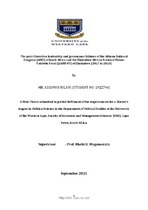| dc.contributor.advisor | Mngomezulu, Bheki R. | |
| dc.contributor.author | Solani, Asisipho | |
| dc.date.accessioned | 2022-02-28T09:05:34Z | |
| dc.date.available | 2022-02-28T09:05:34Z | |
| dc.date.issued | 2021 | |
| dc.identifier.uri | http://hdl.handle.net/11394/8748 | |
| dc.description | Magister Commercii - MCom | en_US |
| dc.description.abstract | The Berlin Conference of 1884-1885 marked the first step towards the partition of Africa. After this date, Europeans began to colonize the continent. Colonialism was an economic enterprise which was meant to boost the economy of the colonizers. Both South Africa and Southern Rhodesia (today known as Zimbabwe) were colonised by the British. This study examines the legacy of colonialism in these two countries. It looks at the impact of colonialism on how liberation movements such as the African National Congress (ANC) and the Zimbabwean African National Union- Patriotic Front (ZANU-PF) have led their respective countries since independence. The specific purpose of this comparative study is to examine the causal factors that have contributed to the failures of African liberation movements in terms leadership and governance since independence. | en_US |
| dc.language.iso | en | en_US |
| dc.publisher | University of Western Cape | en_US |
| dc.subject | Colonialism | en_US |
| dc.subject | Democracy | en_US |
| dc.subject | Liberation struggle | en_US |
| dc.subject | Colonial legacy | en_US |
| dc.subject | Nationalist liberation movement | en_US |
| dc.title | The post-liberation leadership and governance failures of the African National Congress (ANC) of South Africa and the Zimbabwe African National Union-Patriotic Front (ZANU-PF) of Zimbabwe (2017 to 2020) | en_US |
| dc.rights.holder | University of Western Cape | en_US |

